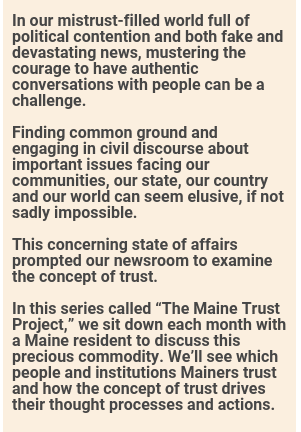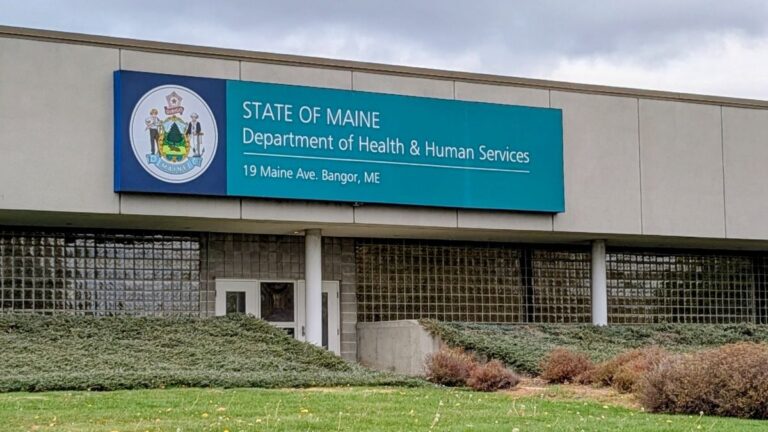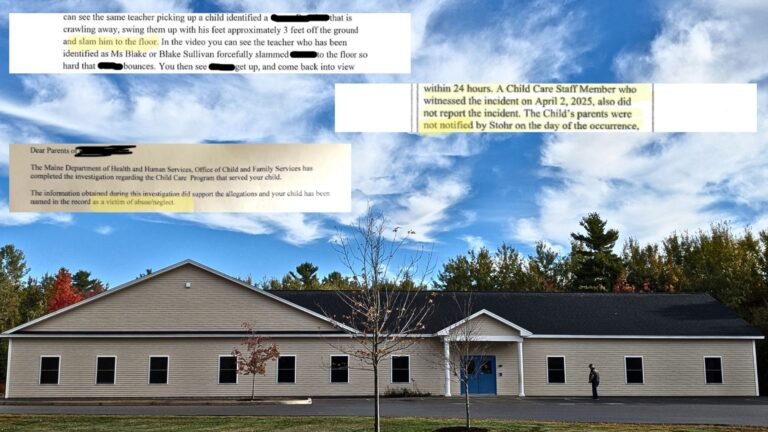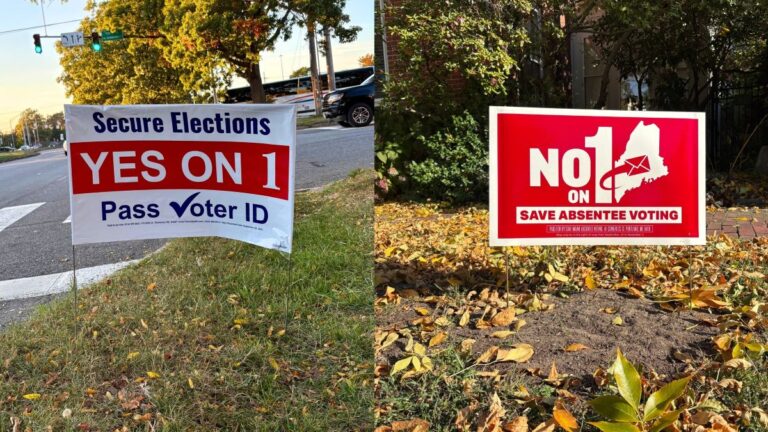The first time Bobby Bergeron went whitewater rafting, it was the first run of the season on the Dead River in The Forks. Barely out of winter, the water was running high and fast and cold.
He had a blast: “I was like, wow. This is like, really wild.”
 The Forks region is whitewater rafting central in Maine, home to rivers with rapids ranging from easy, slow currents (Class 1) to extremely adventurous (Class 4).
The Forks region is whitewater rafting central in Maine, home to rivers with rapids ranging from easy, slow currents (Class 1) to extremely adventurous (Class 4).
Now a seasoned river guide, Bobby depends on trust to keep his guest paddlers and himself safe and having fun in a dynamic environment. “(Paddling guests) need to trust me,” he says. “I need to trust them.”
They learn to trust each other in a short period of time — sometimes in as little as the 15- to 30-minute bus ride to the dam. He has to assure them of his skills, his comfort with being on the river, and his ability to keep them safe, which he does by telling them what to expect and what they’ll need to do and why they need to do it — even if it feels contrary to what they think they should be doing.
He, in turn, has to trust that they’ll do what needs to be done when he asks them to do it.
“The goal is that by the time we get to the water, they trust in my ability and my knowledge and they trust in their own ability and knowledge, to take down the curtain of fear,” he says. Once the fear is gone, everyone can be open to the adventure, the thrill and the fun of being on the river.
Today, Bobby has the confidence in and comfort with himself to pull off this trust magic with relative ease. You’d think he’d been whitewater rafting all his life. But at 31, he’s been at it for less than a decade. In fact, until he arrived at Three Rivers Whitewater Rafting in 2010 as a marketing intern, he’d never done it.
Growing up in Windsor Locks, Conn., less than 30 minutes from Hartford, he thought of himself as a seasoned outdoors recreationalist when he arrived in The Forks. He had snowboarded since he was little and went water skiing, tubing, motor boating and swimming at a lake his family went to pretty much every weekend. He spent as much time outdoors as he could and was attending the University of New Hampshire to study recreational management.
It was his final semester at UNH and a required internship that introduced him to the recreational activity that would relocate him to The Forks and set his career and life on a new trajectory.
When he stepped into an inflated raft and went down the Dead, he found his passion and hasn’t looked back. Today, he’s the company’s river operations manager, handling business operations but also training new river guides and working as a guide himself.
As much as he enjoys the challenges of the business side of things, it’s his experiences on the river that never cease to amaze him and remind him that what he’s doing isn’t just providing people with a good time.
One such experience that has stayed with him was a rafting trip on the Kennebec River that he led for a Hispanic family from Los Angeles. The parents were movie directors and had traveled extensively, but their kids had little experience with the outdoors.
After the excitement of the rapids along the upper section of the Kennebec, they were drifting along, relaxing in the lower section, the kids floating in the water with the current allowing them to keep pace with the raft, which they thought was pretty cool.
From the water, one of the kids said something to his mother in Spanish. The family laughed and she got a little choked up. Bobby asked if she minded sharing. She said that her son said he didn’t know there were so many shades of green.
“To have the thought that my job allowed a young man to see a different shade of green that could have potentially changed his life was very powerful,” he said. “And really was one of those (moments) that drove in (the message) that yes, you are doing the right stuff up here. The hard work and the efforts and the endless hours of training, progressing and growing and moving forward really are for some sort of greater good.”
Q&A
Who meets your definition of trust and how do they meet it?
Bobby: Close friends and the people I work for, who, in many cases, are friends. I’ve worked in many different industries. I’ve worked in restaurants. I’ve worked on farms. I’ve worked all over the place. Everybody says ‘Oh, we’re one big happy family.’ But this is the first time I’ve been able to say that I agree with that statement. I’ve gone on vacation with my CEO and CFO. I’ve spent my own personal time and money to spend personal time and money with them. I spent 30 days in the Grand Canyon with every single one of my higher-ups and we’re still friends and working together and sometimes working more closely and better together because of those experiences. So it is like family.
It’s a very empowering thing — being able to believe and trust people you work with. I trust that they’re going to do their job right beside me and they trust that I’m going to do my job, too. Nobody is afraid to get their hands dirty no matter what their job is and when you can show somebody that you’re not afraid to get your hands dirty, that helps build trust. As a guide trainer and as somebody that helps train staff, I’m the first person to scrub a toilet or wash a dish or swim a rapid. I always tell my trainees before I tell them to swim a Class 2 rapid, I’m going to get in the water and swim a Class 2 rapid. Before we flip a boat, I’m going to flip a boat.
Who doesn’t meet your definition and how do they fail to meet it?
Bobby: I don’t know. I have a hard time trusting people so, initially, I don’t trust anyone. A wise mentor once told me at the end of the day, nine times out of 10, people will choose to make decisions that benefit themselves over somebody else. To not realize that is not intelligent. And I do believe that. I feel that people do have good intentions, but to say that somebody’s going to let me win $100 over them taking $100 is unbelievable. So, it’s not that someone has my trust from the start and then fails to maintain it.
What breaks trust for you?
Bobby: A strand of actions that go against the original agreement. It’s not just a one-time, ‘Oh you screwed up.’ It’s a continuous strand of actions that show one’s true colors.
Can broken trust be healed and if so, what has to happen for healing to take place?
Bobby: Yes. A longer strand of actions than broke it originally.
Has your definition of trust changed over the years, and if so, how?
Bobby: I don’t know that my definition of trust has changed. I’ve always kind of had that wary ‘Well, you can’t trust that guy next door’ attitude. But I feel that my reactions to distrust have changed. When I was younger, I got emotional about it. I got upset. I got angry. Now I try not to let the actions of others impact my emotional brain activity.
How does trust in yourself factor into how you cope with distrust?
Bobby: I think trusting in myself allowed for that change. As I grew professionally and became more confident, I began to have a higher level of trust in myself and my ability to make good decisions. That allows me to put more weight on my decisions and less weight on others’ decisions, so it doesn’t matter that that person screwed me over. I can trust myself to adapt, to change, and continue on with my life. I think a lot of it has to do, also, with getting older and learning to deal with hard times.
Do you think the cultural definition of trust has changed, and if so, how?
Bobby: It’s difficult to answer that because as a young man, I’ve only been truly observing the society and the world that we live in and community for a small period of time. The biggest thing I’ve noticed about cultural trust is the differences regionally.
I grew up in Connecticut. Nobody trusts anybody down there. I came to Maine and found that Maine is definitely more trustworthy versus other areas I’ve lived in. When I’m driving in this area, my keys live in my car. When I drive to visit family in Portland or Connecticut, I lock my car and take my keys with me. So, I think that the level of trustworthiness depends on the area. Part of that is understanding who is in an area — who lives there or why they’re visiting — and the denseness of the population. Two hundred thousand people in six square miles — you have no idea who the people are next to you. There are fewer opportunities to understand the community and to be able to trust. But here, I’m immersed in the community. I’m not worried about people breaking into my house.
And unlike Connecticut, where there’s a lot of fakeness, people in Maine wear their emotions on their sleeve. They let you know how it is. If they don’t like you, they’ll tell you. They’ll tell you why. Whereas in the community I lived before moving here, you never knew where you stood with someone. And in Maine, you can have a relationship with somebody and have completely opposite views. You can argue and have educated conversations, and at the end of the day, you’ve both shared your experiences, you both shared how you felt about it, and even though you may not see eye to eye, you can still trust that person. Knowing they’re going to honestly express their feelings allows me to be able to honestly express my feelings. I feel like that way of being has impacted my own personal life because it has allowed me to really pursue my goals and to be more open about how I feel about things. Instead of feeling bad if a friend or family member doesn’t agree with the decisions I make to accomplish my goals, I don’t feel any hesitation about pursuing my goals.
What worries you?
Bobby: Technology has made things easier for us and allowed us to do amazing things, but I don’t necessarily think that’s making us a stronger species. To be willing to adapt, to change. Willing to put yourself in a stressful or dynamic situation. People are less apt to do that. People are less apt to deal with a hard issue or deal with a difficult activity because our culture and technology has allowed us more ways around that.
In my job, I get to meet people from all walks of life, from all over the country, all over the world, all over the state. I’m worried that people are less willing to grow themselves because, maybe, because of fear of failure. So, they’re less apt to push the envelope or to change things up or to rattle things up. They say ‘Well, that’s the way it is. Life sucks.’ They’re unhappy and not willing to change it. Because it’s going to be hard? Because of the work I do, I know that hard things can be done and may not be as hard as they thought they would be.
I have a fear that people are becoming weaker because they just want things to be easy. They are not willing to tackle a task that might be hard, that might be a challenge, or that might not work. But maybe it will. Maybe if it works, you become this amazing human being that just accomplished something that nobody would have thought of.
What inspires you?
Bobby: Stories of success, hard work and struggle. The story of the millionaire that just made another million dollars — that doesn’t impress me. But the story of somebody who had a hardship and worked hard through it and succeeded — that inspires me.
I am also inspired by working towards and creating something beautiful that has the potential to be powerful and amazing. I do artwork. It’s beautiful and amazing to create something out of nothing. There’s also beauty in making change — like, making political change to laws that affect people’s lives.
What issues do you think are important today?
Bobby: I think environmental conservation is definitely important — trying to limit our impact on the world so it can continue on. What I feel is that we need to be more aware of our impact. I feel that people should have an understanding that actions do have consequences, and that as a society, we should try to limit the impact of what we’re doing.
Get to know Bobby Bergeron
Age: 31
Residence: Caratunk and Stratton
Religious affiliation: None
Political affiliation: None
How he describes himself: Honest, composed and daring. I’m a very hard-working individual. I put my soul in my work. My job is part of my life and I think that’s OK. I’m doing what I love, and that’s what makes me happy.
How he defines trust: Trust is being truthful and being honest. It’s a feeling of comfort with yourself and others that comes from truthfulness and honesty.







